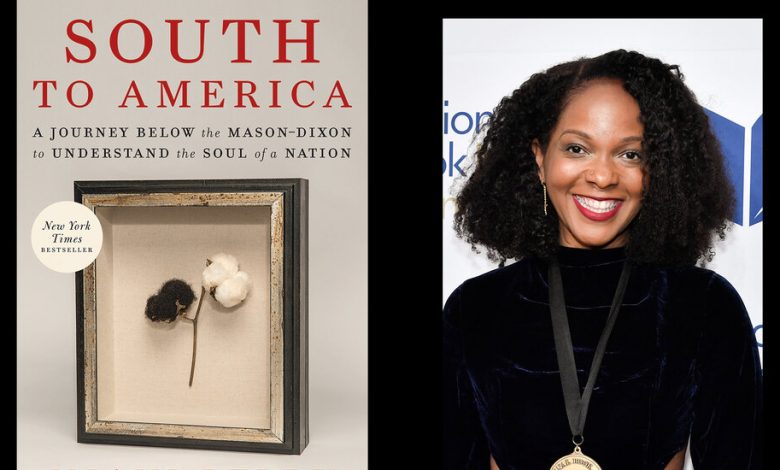Imani Perry Wins National Book Award for ‘South to America’

Imani Perry won the National Book Award for nonfiction on Wednesday for “South to America: A Journey Below the Mason-Dixon to Understand the Soul of a Nation,” in which Perry, a professor of African American studies at Princeton, travels to the American South, where she is from, to examine race, culture, politics and identity.
The book “straddles genre, kicks down the fourth wall, dances with poetry, engages with literary criticism and flits from journalism to memoir to academic writing,” Tayari Jones wrote in The New York Times Book Review. Any attempt to classify it “only undermines this insightful, ambitious and moving project.”
In her acceptance speech, Perry said: “I write for my people. I write because we children of the lash-scarred, rope-choked, bullet-ridden, desecrated are still here, standing.”
She added: “I write for the sinned-against and the sanctified. I write for the ones who clean the toilets and till the soil and walk the picket lines. For the hungry, the caged, the disregarded, the holding on — I write for you. I write because I love sentences, and I love freedom more.”
Tess Gunty won the fiction prize for her debut novel, “The Rabbit Hutch,” which takes place over the course of a summer week in an affordable housing complex in a fictional Indiana city.
Gunty said she was so convinced she wouldn’t win that she did not prepare a speech, but she did read her fellow finalists.
“They attended to those who are structurally neglected, and they humanized experiences that are not visible normally,” Gunty said. “So I want to thank them for putting their books into the world, and everyone who helped them do that.”
The National Book Award, established in 1950, is among the most prestigious literary awards in the world, a prize that can change the trajectory of an author’s career. After two years of ceremonies held remotely, this year’s took place in person at Cipriani Wall Street, a restaurant in New York.
It was a night of celebration, but concerns about a wave of book challenges and bans across the country hung over the festivities. The American Library Association found that there had been more book challenges last year than at any time since the organization began tracking book banning more than 20 years ago. This year, the rate of challenges has increased, the association said. The evening opened with remarks by Padma Lakshmi, the author and TV host, with a speech that focused on the rise of book banning.
The Literarian Award for Outstanding Contribution to the American Literary Community was awarded to Tracie D. Hall, the executive director of the American Library Association. The library association, a nonpartisan group that promotes libraries and library education, has become something of a political lightning rod in recent years, targeted by groups that have pushed to challenge books and change the way titles are acquired and managed.
“Please, please stand against this effort to limit access to reading,” Hall said. “Remember: Free people read freely.”
Hall’s award was presented by Ibram X. Kendi, the author of “How to Be an Antiracist” and a co-author of “Stamped: Racism, Antiracism, and You,” which has been among the most frequently banned books in the country, according to the American Library Association.
The Medal for Distinguished Contribution to American Letters, a lifetime achievement award that has previously been awarded to Toni Morrison, Don DeLillo and Ursula K. Le Guin, went to Art Spiegelman, the author of “Maus,” a Pulitzer Prize-winning graphic novel about the Holocaust. “Maus,” which depicts Jews as mice and Nazis as cats, has also been banned this year.
The finalists for the fiction prize included Gayl Jones’s novel “The Birdcatcher,” about an artist who tries repeatedly to kill her husband; Jamil Jan Kochai’s collection “The Haunting of Hajji Hotak and Other Stories,” which examines the legacy of trauma and war among Afghans and the Afghan diaspora; Sarah Thankam Mathews’s novel “All This Could Be Different,” about a young woman’s coming of age as she navigates family ties in India; and Alejandro Varela’s “The Town of Babylon,” which follows a gay Latino professor who returns to his hometown and rediscovers his roots.
Finalists for the nonfiction prize included Meghan O’Rourke’s “The Invisible Kingdom: Reimagining Chronic Illness,” about the author’s yearslong battle with mysterious, and misdiagnosed, medical conditions; David Quammen’s book “Breathless: The Scientific Race to Defeat a Deadly Virus,” which delves into the Covid-19 pandemic; Ingrid Rojas Contreras’s memoir, “The Man Who Could Move Clouds,” which centers on her late grandfather; and Robert Samuels and Toluse Olorunnipa’s “His Name Is George Floyd: One Man’s Life and the Struggle for Racial Justice,” about the man who was killed in police custody in Minneapolis in 2020.
The award for poetry went to John Keene for “Punks: New and Selected Poems,” a collection divided into sections that covers decades of Keene’s career, including poems that examine love, Blackness, family and queer life.
Sabaa Tahir received the young people’s literature award for “All My Rage,” which follows a working-class Pakistani American family from Lahore to Juniper, Calif., where they run a motel. In her acceptance speech, Tahir said she was the first Muslim and Pakistani American woman to win the award.
Samanta Schweblin won the award for translated literature for “Seven Empty Houses,” which was translated by Megan McDowell. It is a dark collection of seven stories in which furniture, memories or people are missing.
As publishers, editors and authors made their way into Cipriani for the ceremony and a steak dinner, they were given fliers about an ongoing strike among unionized HarperCollins employees, who have been working without a contract since April.